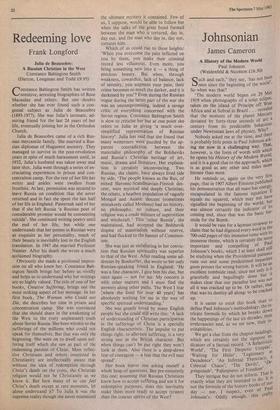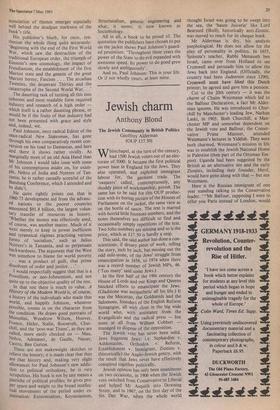Johnsonian
James Cameron
A History of the Modern World Paul Johnson (Weidenfeld & Nicolson £16.50) and such,' they say, 'has not been seen since the beginning of the world'. So when was that?
'The modern world began on 29 MaY 1919 when photographs of a solar eclipse, taken on the island of Principe off West Africa and at Sobral in Brazil . . . revealed that the motions of the planet Mercury deviated by forty-three seconds of arc a century from its predictable behaviour under Newtonian laws of physics. Why? Nobody asked me at the time, and there is probably little point in Paul Johnson ask- ing me now in a challenging way. That, however, is the form of words with which he opens his History of the Modern World, and it is a good clue to the approach, which is as good as any other and miles more literate than most. He reminds us, again on the very first page, that in 1907 Albert Einstein published his demonstration that all mass has energy: encapsulated in the famous equation E equals me squared, which may not have signalled the beginning of the world, but was almost certainly the indicator of its mcoumlainfgorenthde, Bsionmceb.that was the basic for- It would be vain for a layman reviewer to claim that he had digested every word in the 700-odd pages of this immense tome with its immense theme, which is certainly the most important and compelling of Paul Johnson's books, which I at least shall still be studying when the Providential patience runs out and some predestined impatient goon presses the wrong button. It will be an excellent tombside read, since not only is it gracefully and beguilingly done but it makes clear that our paradise lost was not all it was cracked up to be. Or rather, that that was its destiny all along: to be cracked up. It is easier to extol this book than to define Paul Johnson's methodologY, the in- tricate formula by which he breaks down the happenings of the last six decades, their irrelevancies and, as we see now, their in- evitabilities. We get a clue from the chapter-headings, which are certainly not the signpost in- dicators of a factual record. 'A Relativistic World', 'The First Despotic Utopias', 'Waiting for Hitler', 'Legitimacy in Decadence', 'An Infernal TheocracY, Celestial Chaos'; 'The Devils', 'De" gringolode% 'Palimpsests of Freedom'.
They intrigue but do not inform. That is exactly what they are intended to do. It is
dnoayt the orfourmula of the history books of our I suspect, even of Pa Johnson's. Oddly enough, this crafty
association of themes emerges especially well behind the deadpan starkness of the book's title.
His publisher's blurb, for once, syn- thesises the whole thing quite accurately: 'Beginning with the end of the First World War, which saw the destruction of the traditional European order, the triumph of Einstein's new cosmology, the impact of Freudianism, the establishment of the first Marxist state and the genesis of the great Marxist heresy, Fascism . . . The arcadian Twenties, the desperate Thirties and the catastrophe of the Second World War...'
The daunting task of turning all this into coherent and most readable form required Industry and research of a high order which itself is a rather daunting phrase, or would be if the fruits of that industry had not been presented with grace and style and, indeed, wit.
Paul Johnson, once radical Editor of the once-radical New Statesman, has gone through his own comparatively recent con- version on his road to Damascus, and here and there it shows rather vividly. As Marginally more of an old Asia Hand than Mr Johnson I would take issue with some of his contemptuous asides on, for exam- ple, Nehru of India and Nyerere of Tan- zania; he is rather casually scornful of the Bandung Conference, which I attended and he didn't.
He quite rightly points out that in 1960-73 development aid from the advanc- ed nations to the poorer countries amounted $91.8 billion, the largest volun- tary transfer of resources in history. Whether the money was effectively used, of course, was another matter. Much of it went merely. to keep in power inefficient and tyrannical regimes practising various forms of 'socialism,' such as Julius Nyerere's in Tanzania, and so perpetuate backwardness. The argument that the West was somehow to blame for world poverty
• • . was a product of guilt, that prime dissolvent of order and justice. .
I would respectfully suggest that that is a Powellism, or neo-Johnsonism, and not quite up to the objective quality of the rest.
In that rest there is much to value. A History of the Modern World is, of course, a history of the individuals who made that world, and happily Johnson, whenever Possible, zooms in on the character from the condition. He draws good portraits of Mussolini, Woodrow Wilson, Hoover, Franco, Hitler, Stalin, Roosevelt, Chur- chill, and the 'post-war Titans', as they are called, more easily checked on — Mau, Nehru, Adenauer, de Gaulle, Nasser, Castro, Ben Gurion.
These are not makeweight sketches to relieve the history; it is made clear that they are that history and, making very slight allowances for Paul Johnson's new addic- tion to political orthodoxy, he is very scrupulous. His book is not by any means a Pastiche of political profiles; he gives pro- per space and weight to the broad intellec- tual movements of the period under ex- amination: Existentialism, Keynesianism,
Structuralism, genetic engineering and what, it seems, is now known as Sociobiology.
All in all, a book to be proud of. The quotation the publishers have chosen to put on the jacket shows Paul Johnson's guard- ed pessimism: 'Throughout these years the power of the State to do evil expanded with awesome speed. Its power to do good grew slowly and ambiguously'.
And so, Paul Johnson: This is your life. Or if not wholly yours, at least mine.











































 Previous page
Previous page